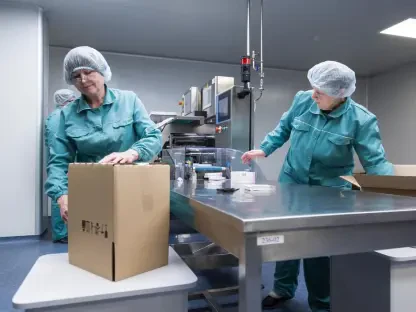Navigating the dynamic landscape of early-stage medtech and biopharma startups presents a unique set of challenges, especially in the face of federal funding cutbacks. Faisal Zain, an expert in medical technology and innovation, provides insights into alternative funding solutions and the evolving role of accelerators like the Altitude Lab in supporting these burgeoning companies.
How have federal funding cutbacks impacted early-stage medtech and biopharma companies?
The cutbacks have undeniably posed significant challenges. Federal funding is often a lifeline for early-stage startups, enabling them to develop breakthrough technologies and treatments. With reduced access to these funds, startups are finding it increasingly difficult to sustain their operations and push their innovations forward. This scenario compels them to seek alternative funding sources and become more strategic with their resource allocation.
What are some resourceful strategies entrepreneurs can adopt to support their business goals during this challenging time?
Entrepreneurs need to be flexible and innovative in their approach. Building strong partnerships and collaborations can be crucial, allowing resource sharing and reducing operational costs. Additionally, focusing on a lean business model can help manage expenses effectively while maintaining a clear strategic vision.
Can you explain what alternative funding opportunities are available for early-stage life science startups?
Alternative funding opportunities include leveraging venture capital and private equity, pursuing strategic partnerships with larger companies, and taking advantage of non-dilutive funding options such as grants from foundations or organizations outside of traditional federal channels. Crowdfunding is another interesting avenue, which can also serve as a market validation tool.
What role does the Altitude Lab accelerator play in supporting health-related startups facing funding challenges?
Altitude Lab provides a comprehensive support system for startups, offering mentorship, networking opportunities, and access to essential facilities. Given the current funding landscape, accelerators like Altitude Lab are instrumental in helping startups refine their business models and attract investment, filling gaps left by traditional funding cuts.
How significant are SBIR grants for biotech innovation, and what consequences have arisen from the recent cuts?
SBIR grants have been fundamental in fostering innovation, providing early-stage companies with the capital to bring their ideas to fruition. The reduction in these grants has created a substantial void, potentially slowing down the pipeline of new innovations and reducing the diversity of projects being developed at the ground level.
Could you describe the big picture of how NIH funding cuts are affecting the life science landscape?
NIH funding cuts ripple through the life science sector, influencing everything from research capabilities to employment opportunities within startups. Reduced funding can discourage innovation and slow down the development of therapies that could benefit countless patients. It also forces the industry to reshape its strategies and explore creative solutions to sustain growth.
What kind of advice are you providing to startups you’re involved with?
I’m encouraging startups to be resilient and adaptable, to constantly evaluate and pivot their strategies as necessary. It’s important to stay informed about industry trends, engage with potential investors early, and explore diverse funding options. Building a strong team and network is just as critical to overcoming obstacles in the current environment.
What recent medtech and biotech developments have you observed that excite you?
There’s remarkable progress in areas such as personalized medicine, where treatments are tailored to individual patient profiles, and digital health solutions that leverage data analytics for better outcomes. Additionally, the integration of technology in diagnostics is transforming the speed and accuracy with which we can detect diseases.
How are technologies evolving in this sector, and which ones are particularly promising?
Technologies are advancing rapidly, with artificial intelligence and machine learning making significant inroads in predictive analytics and drug discovery. Bioprinting and CRISPR gene-editing technology also hold immense promise for their potential to revolutionize treatment methodologies and precision medicine.
In what ways do accelerators contribute to the growth of early-stage life science companies?
Accelerators play a critical role by providing mentorship, resources, and a platform for startups to validate and scale their ideas. They offer access to a network of experts and investors, which can be invaluable for young companies navigating the complexities of their industries.
What impact is artificial intelligence having on the current and future state of life sciences?
AI is transforming life sciences by enhancing data analysis capabilities, optimizing clinical trials, and innovating drug discovery processes. It’s enabling a more personalized approach to medicine and creating efficiencies that were previously unattainable. AI’s potential to shift paradigms in healthcare is truly groundbreaking.
From your perspective, what is the overall outlook for early-stage life science startups in the current funding climate?
While the funding climate presents challenges, it also offers opportunities for those willing to adapt and innovate. Startups that can differentiate themselves with unique business models and secure diverse funding sources are poised for success. The industry is vibrant and full of potential, with advancements in technology continuing to inspire new solutions.
What is your forecast for the role of accelerators in the growth of early-stage life science companies?
Accelerators will increasingly become pivotal to driving startup growth, especially in light of dwindling traditional funding sources. They’ll continue to evolve, offering more tailored support and fostering ecosystems that promote collaboration and innovation, crucial for the sustained development of early-stage life sciences.









